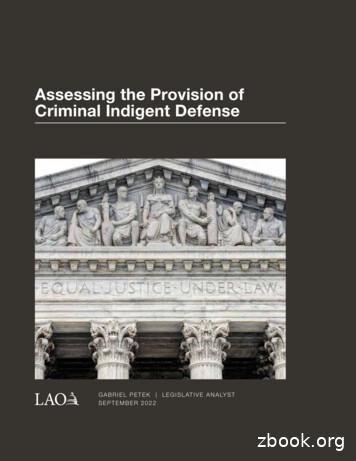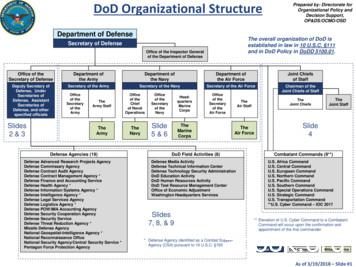Indigent Defense, Counsel & Other Procedural Issues
Indigent Defense, Counsel & Other Procedural IssuesIndigent Defense, Counsel& Other Procedural IssuesJuvenile Justice Guide Book for Legislators
Indigent Defense, Counsel & Other Procedural IssuesIntroductionThe American legal system is adversarial in nature; it relieson ardent advocacy from skilled attorneys to argue for thepositions of their clients. The quality of representation providedplays a key role in the outcome of court decisions. Indigentjuveniles rely on states for legal assistance at their delinquencyproceedings, a right guaranteed to them by the 1967 U.S.Supreme Court case In re Gault.To protect this right, states face the challenge ofdetermining how to offer adequate legal counsel inlight of financial and human resource limitations.Past efforts to protect a child’s right to an attorneyhave not always led to the desired results. The1993 American Bar Association (ABA) report,America’s Children at Risk: A National Agenda forLegal Action, examined deficiencies in America’sjuvenile defense systems and recommendedstructural improvements for overwhelmed attorneys.Recommendations included limited caseloads, earlycase involvement, comprehensive initial training,continued education, an increase in support staff2and hands-on attorney supervision. These measuresrequire both increased resources for juveniledefenders and attorney-client interaction before theinitial court appearance. Although this report is now17 years old, the issues it identified remain relevantfor improving juvenile representation.State lawmakers are in a position to decide whatlegislative measures are appropriate to provideindigent juveniles with legal defense. Policy decisionson procedures for indigence determinations,limitations on waiver of counsel, juvenile competencyevaluations and allocations of attorney resources allhave an impact on the quality of representation.
Juvenile Justice Guide Book for LegislatorsDetermination of IndigenceMost states appoint counsel to youths only upon aAn “indigent defendant” isdetermination that they qualify as indigent, andsomeone who has been arrested orthe application process for receiving counsel variescharged with a crime punishablefrom state to state. An “indigent defendant” issomeone who has been arrested or charged with acrime punishable by imprisonment and who lackssufficient resources to hire a lawyer without sufferingby imprisonment and who lackssufficient resources to hire a lawyerwithout suffering undue hardship.undue hardship. In at least one state—Michigan—the juvenile court must appoint an attorney torepresent a youth regardless of indigence status, butthis is not the norm.3
Indigent Defense, Counsel & Other Procedural IssuesObtaining Court-Appointed CounselMany states—such as Florida, Delaware, Georgiaand Tennessee—require administrative fees tosubmit an application to apply for court-appointedcounsel. Florida charges 40, Delaware 100,Georgia 50 and Tennessee 50. Some considerthese fees prohibitive to youths who have very littlemoney, while others regard these fees as small andnecessary to cover costs associated with providinglegal defense. Each of these states has a mechanismto waive its fees if they would be prohibitivelyexpensive to the defendant.Once a state receives an application for juvenileindigent counsel, state appointed decision makersmust rule on the submission. In Alabama, thepresiding judge determines indigence, whileGeorgia leaves it to the public defender’s officeor any other agency providing the service. Otherstates, including Florida, assign the task to the clerkof the court. Most—if not all—states use thesemechanisms or some combination thereof to makethe indigence determination.During the assessment, the decision maker considersnumerous factors, some statutorily enumerated,others included in administrative codes. Moststates use a combination of objective rules suchas a percentage of the federal poverty guidelines( 22,350 for a family of 4 in the year 2011) andmore subjective standards such as “substantialhardship” to guide the decision. Florida, Georgiaand Texas use both of these standards for makingindigence assessments.4A key factor in these determinations is whether theevaluator uses the parents’ or the juvenile’s financesas the basis for their assessment. In most states—including Maine, Massachusetts and Kentucky—thecourt considers the parents’ financial status. Georgialaw also considers the parents’ finances, but allowsthe child’s finances to be used if a conflict of interestexists between the parent and the juvenile. In at leastone state—North Carolina—the child is presumedfiscally indigent unless they or their parents hireprivate counsel.Once a state receives anapplication for juvenile indigentcounsel, the decision maker mustevaluate either the parents’ orthe child’s finances and otherenumerated factors to maketheir ruling.Texas will presume indigence if certain factors aremet, including whether the parents are incarceratedor receive food stamps.Waiver of CounselAlthough it is every child’s right to be represented byan attorney, lack of understanding and appreciationfor that right have caused many to decline it.Children tend to distrust adults—especially strangers
Juvenile Justice Guide Book for Legislatorssuch as a lawyer—they meet because they are introuble. As a result, children nationwide often waivetheir right to counsel without truly understandingthe consequences.children nationwide often waivetheir right to counsel without trulyunderstanding the consequences.According to the National Juvenile Defender Center,juveniles who waive counsel are more likely to enterguilty pleas without offering arguments or mitigatingcircumstances to the court and more likely to be sentto detention facilities.The American Bar Association believes juvenile waiverof counsel should be completely prohibited, but moststates that ban waiver only do so in limited situations.Iowa, for example, bars a child’s ability to waive hisor her right to counsel depending upon factors likethe child’s age and the potential consequences of theproceedings against them.If a state does not want to completely bar juvenilewaiver of counsel, the ABA recommends othermeasures, including requirements that a juvenilemeet with an attorney prior to waiver, as is requiredin California, Colorado and Indiana. The ABA alsorecommends that states procedurally require allwaivers to be submitted in writing in open court;that the waiver be renewed at each later stage ofcourt proceedings; and that, if the right to counselis waived, stand-by counsel be appointed and a fullinquiry be made into the youth’s capacity to makethe choice.Adhering to these suggestions, Louisiana law allowsjuveniles to competently waive their right to counselafter consultation with an attorney, parent orcaretaker, and after the court explains the rights andthe consequences of waiver to both the child and hisor her guardian. The law also completely prohibitswaiver when a child is in a proceeding that can resultin placement in a mental hospital, psychiatric unitor substance abuse facility, when the child is chargedwith a felony delinquent act, or when a court rulingaffects probation or parole revocations.Competency to Stand TrialTo stand trial in the United States, defendants mustbe deemed mentally competent to understandthe nature of the charges brought against them.Although mental sufficiency has generally focusedon mental illness and developmental disability,increased attention is being given to juvenileincompetence based upon emotional and mentalimmaturity. Research conducted by the MacArthurFoundation Research Network on AdolescentDevelopment and Juvenile Justice found thatmany children, especially under age 15, may notbe capable of participating competently with theirattorneys at their own trials.5
Indigent Defense, Counsel & Other Procedural IssuesAn attorney’s ability to effectively represent a clientcan be greatly affected by how they are able torelate to, and gather facts from, their client. TheMacArthur study found that children were lessable to understand the nature and purpose of theirtrial, less likely to give their attorney necessaryinformation, and less able to view their situationrationally. As a result, the MacArthur reportrecommends an expanded definition of competencefor juveniles that takes social and cognitivedevelopment into account.If an evaluation of the youth isordered, the subsequent reportmust consider the child’s ability torationally understand the chargesand potential punishments. It mustalso assess the child’s capacity toparticipate meaningfully with theattorney in preparing his orher case.Some states have incorporated these and similar ideasinto their statutes. Florida’s juvenile competency law,for example, allows either the court or a presentattorney to make a motion for a determination ofthe child’s competency. If an evaluation of the youthis ordered, the subsequent report must consider thechild’s ability to rationally understand the chargesand potential punishments. It must also assess the6child’s capacity to participate meaningfully with theattorney in preparing his or her case.Similarly, a 2010 California law requires a child tohave a rational and factual understanding of theproceedings against him or her. The law also requiresthat a child development expert apply “acceptedcriteria” in evaluating the child in question.Challenges to ProvidingAdequate Juvenile DefenseAccording to the American Bar Association, excessiveworkloads for attorneys representing the indigentcan limit the quality of their counsel. The ABAguidelines for assessing whether legal representationis being negatively affected include whether enoughtime is being given to client interviews; whetherfactual investigations can be conducted, and whethersufficient preparations are made for pretrial hearingsand trials.According to the National Juvenile Defender Center,attorneys who practice juvenile defense generally takeon a high number of cases, lack access to experts, andhave little to no staff assistance with administrativeand investigative tasks. The pressures caused by theseconditions leave juvenile defenders little time to buildrelationships with their clients, which can negativelyaffect their representation.A survey of juvenile court judges conducted bythe National Juvenile Defender Center found thatjudges often want more background information ona child’s education needs, medical and psychological
Juvenile Justice Guide Book for Legislatorsevaluations and family characteristics. This factualinformation can be determined by investigations andclient interaction.ConclusionJuvenile crime is a challenge for states inmany respects, and the administration.attorneys who practice juvenileof indigent defense is no exception. Atdefense generally take on a higheach step in the process—from indigentnumber of cases, lack access tocounsel application fees to adjudicationsexperts, and have little to no staff—states balance the child’s rights andassistance with administrative andneeds against their ability to finance andinvestigative tasks.administer representation. State optionsto address juvenile defense includemaking it more difficult for juveniles toReports issued by many states—including Maine,Ohio and Virginia—have found that late attorneyinvolvement and low ancillary resources have causedproblems for juvenile representation. In a 2009New Jersey Supreme Court case, State ex rel. P.M.P.,potential ways to address these issues were identified.It held that the right to counsel in delinquencyproceedings attaches when a complaint is filed and ajudicially approved arrest warrant is obtained. Thisearly presence may allow attorneys more time toinvestigate a child’s history, factual circumstances ofthe crime, and to develop an appropriately tailoredstrategy with dispositional alternatives.waive counsel, changing processes fordetermining indigence and increasingjuvenile defender resources to betterensure complete and competent counsel.For references and additional resources, pleasesee the References, Glossary & Resources section.7
7700 East First Place Denver, CO 80230 (303) 364-7700 www.ncsl.org
juveniles who waive counsel are more likely to enter guilty pleas without offering arguments or mitigating circumstances to the court and more likely to be sent to detention facilities. The American Bar Association believes juvenile waiver of counsel should be completely prohibited, but most states that ban waiver only do so in limited situations.
The government is required to provide and pay for attorneys for those individuals who are unable to afford private attorneys. This is known as "indigent defense." Importance of Effective Indigent Defense. In addition to being a constitutional right, effective indigent defense in criminal proceedings can help mitigate or eliminate major
oklahoma indigent defense system p.o. box 926 norman, oklahoma 73070 (405) 801-2601 capital trial counsel application please note: the oklahoma indigent defense system board has adopted the american bar association guidelines for the appointment and performance of counsel in death penalty cases. this
PSI AP Physics 1 Name_ Multiple Choice 1. Two&sound&sources&S 1∧&S p;Hz&and250&Hz.&Whenwe& esult&is:& (A) great&&&&&(C)&The&same&&&&&
Argilla Almond&David Arrivederci&ragazzi Malle&L. Artemis&Fowl ColferD. Ascoltail&mio&cuore Pitzorno&B. ASSASSINATION Sgardoli&G. Auschwitzero&il&numero&220545 AveyD. di&mare Salgari&E. Avventurain&Egitto Pederiali&G. Avventure&di&storie AA.&VV. Baby&sitter&blues Murail&Marie]Aude Bambini&di&farina FineAnna
The program, which was designed to push sales of Goodyear Aquatred tires, was targeted at sales associates and managers at 900 company-owned stores and service centers, which were divided into two equal groups of nearly identical performance. For every 12 tires they sold, one group received cash rewards and the other received
were beyond the authority contemplated by the Texas Family Code and/or the Texas Civil Practice and Reme-dies Code. (2) The Hidalgo County Indigent Defense Plan pro-vides that counsel for indigent defendants are to be appointed from a public rotational list. Under the rules of the Texas Indigent Defense Commission, if the top 10% of
Defense Advanced Research Projects Agency. Defense Commissary Agency. Defense Contract Audit Agency. Defense Contract Management Agency * Defense Finance and Accounting Service. Defense Health Agency * Defense Information Systems Agency * Defense Intelligence Agency * Defense Legal Services Agency. Defense Logistics Agency * Defense POW/MIA .
College"Physics" Student"Solutions"Manual" Chapter"6" " 50" " 728 rev s 728 rpm 1 min 60 s 2 rad 1 rev 76.2 rad s 1 rev 2 rad , π ω π " 6.2 CENTRIPETAL ACCELERATION 18." Verify&that ntrifuge&is&about 0.50&km/s,∧&Earth&in&its& orbit is&about p;linear&speed&of&a .























